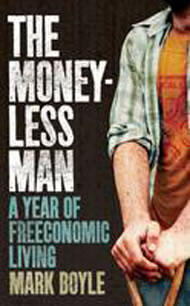Could humanity live without money? Or, as I suspect, is it now more appropriate to ask 'Can humanity survive with it?'
This is the big question I found myself pondering one evening three years ago. I'd just spent four years studying economics - a period during which I hadn't once heard the term 'ecology' – having signed up for the course with the intention of earning as much money as possible. That was until, in my final year, I read a book about Gandhi which convinced me to put my training to use in the organic food industry, instead of the world of high finance.
But after six years of managing various ethical businesses, the answer I to my big question that autumnal evening was an unequivocal 'no'.
I was discussing the world's major issues - environmental destruction, sweatshops, factory farms, wars over resources - with a friend and we were wondering which of the many causes we should dedicate our lives to helping. Not that either of us felt we could make much difference; we were just two small fish in a hugely-polluted pond. But it was then I realised that these symptoms of global malaise were not as unrelated as I had previously thought and that the common thread of a major cause ran through them: our disconnection from what we consume.
I realised that if we all had to grow our own food, we wouldn’t waste a third of it as we do now in the UK. If we had to make our own tables and chairs, we wouldn’t throw them out the moment we fancied a change of interior décor. If we could actually see the look on the face of the child who, under the eyes of an armed soldier, cuts the cloth for the cheap garment we are tempted to buy from that discount High Street chain, we’d probably give it a miss. If we could see the conditions in which a pig is slaughtered, we’d probably pass on the bacon butty and if we had to clean our own drinking water, we sure as hell wouldn’t pollute it in any way.
The tool that enables this disconnection – this vast degree of separation between us and that which we consume – is money. Without the functionality it provides, we would have to have a much closer relationship with the products we use and the people who make them, giving us a deeper appreciation for the embodied destruction, energy consumption (human and fossil fuel) and suffering in the things we currently buy. To not, at least, consider this reality is to bury our heads in the sand. As long as the degrees of separation between the consumer and the consumed stay so wide and for as long as our only connection comes through the emotional filters of a fibre optic cable and television set, then can we realistically foresee the changes that need to take place to the extent they need to?
This tool (money) doesn’t just enable the liquidisation of the planet's natural assets either; it also destroys communities. The very way our money is created today; as debt, through private corporations known as banks, has been designed to create a spirit of collective competition, not cooperation. It has also come to replace community as most people's primary source of security in life. And it doesn't stop there. It allows us to easily and imperishably store the profits that inevitably arise from the economies-of-scale that it enables, such as flatpacking rainforests and turning them into e-money, all without any regard for the consequential ecologies-of-industrialisation. Not only does money endanger our physical survival, it hinders our spiritual evolution to boot. Not money, per se: but the whole concept of exchange.
I believe the time is now right for humanity to move beyond exchange to what I call 'pay-it-forward' economics, the philosophy that the Freeconomy Community was founded on. Prostitution is to sex what buying and selling is to giving and receiving. Paying-it-forward requires no exchange, just a desire to give what was never yours to begin with in the confidence that you'll organically receive whatever is needed, when required.
But whilst intellectualising the need to evolve beyond money was one thing; doing it, was another. As Gandhi once said, 'be the change you want to see in the world', whether you are 'a minority of one, or a majority of millions'. I decided to try living without money for a whole year, to see how it would feel physically, mentally, emotionally and spiritually. Not that I was sure that in a world driven by the need to accumulate ever more of it, this would even be possible. How would I eat, brush my teeth, cook, wash, keep warm and dry, get from A to B, communicate, wipe my bum, write, read, clothe myself and – most importantly – have a lot of fun in the process, without it?
My book, The Moneyless Man, traces my sometimes exhausting, but usually magical journey into the unknown; exploring deeper the reasons why I wanted to do this, reliving the many life-affirming experiences I had along the way and describing the practicalities involved, before honestly sharing the lessons I learned about myself, nature and society in the process. Mixed throughout are tales of love, pain, friendship, happiness, disbelief and above all else, hope.
This journey has changed my life irrevocably; what started as a one year experiment has become a life's work. Plans to scale it up are already underway, as I now truly believe that until we give as Nature does - freely and unconditionally - we will never live in harmony with ‘Her.’
The Moneyless Man: A Year of Freeconomic Living is published by Oneworld, 2010. ISBN: 978-1-85168-754-1. Mark Boyle is the founder of The Freeconomy Community www.justfortheloveofit.org







